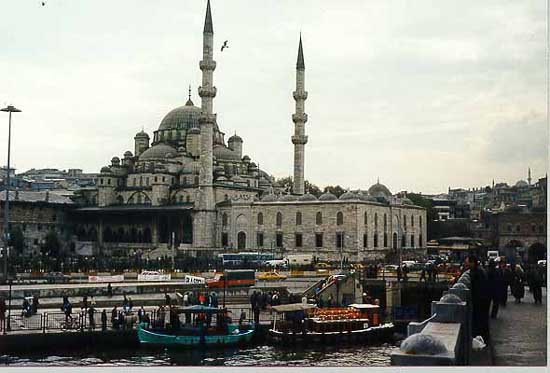
After getting married to my Turkish husband and moving to Istanbul, the theme of the Roma seemed to follow us in our lives together. Not surprising I suppose, since this city too boasts a healthy population of Roma; the Human Rights Association (IHD) estimates that the Turkish population of Roma is between 3 and 3.5 million, and though most of Turkey's Roma reside in the region of Thrace, in cities such as Edirne and Babaeski, there is a healthy Roma population in Istanbul as well. In Istanbul, the typically Roma "mahalles" (neighborhoods) include Kasımpaşa, Curukluk, Küçükbakkalköy, Sulukule, and Üsküdar's Selamsız neighborhood. When I first moved to Turkey, I always heard the word "çingene" being used to describe the Roma, which is the Turkish equivalent of the English word "gypsy," which is itself now considered by many to be a derogative way to label the Roma. The word "gypsy" is also based on the incorrect assumption made by Europeans that the Roma had come from Egypt. Despite its false premise though, the label stuck. But there are also other words used in Turkey to talk about this ethnic group, and many of them are regional. People also call the Roma "Kipti," "Mirti" (in Hakkari, Mardin, Siirt and the southern part of Van), "Köçer," "Arabacı," (the ones who drive horse carriages), etc., and then there is the aphorism "esmer vatandaş" ("brunette citizen"), which is a reference to the often darker hair and skin color of the Roma. There is also a different group of Greek Christian Roma, the Balamorons, identified in Turkish as "Yunan çingeneleri," which means the "Greek gypsies."
Bulgaria RPCV Julia Konmaz writes: Time of the Roma in Istanbul
Time of the Roma in Istanbul
Time of the Roma in Istanbul - Even before my husband told me, many years ago, that he thought of us as "gypsy aristocrats," I had an almost borderline unhealthy interest in Roma culture. <br>
Even before my husband told me, many years ago, that he thought of us as "gypsy aristocrats," I had an almost borderline unhealthy interest in Roma culture.
Maybe it is because the family I grew up in moved around the world "like gypsies," my mother would always say, laughing. Or maybe it is the first glimpses I caught of the Roma in Italy in my early 20s. The Roma population in Lovech, the small Bulgarian town where I lived for two years as a Peace Corps volunteer in the early 1990s, was also considerable. I think I heard a lot of Romani spoken while I was in Lovech, though oddly, looking back, some of it seems to have been mixed with Turkish, too. It is perhaps not surprising that I lived among and met so many Roma when I was in Bulgaria; research shows that of the 15 to 30 million Roma that most estimate make up the worldwide Roma population, the greatest concentration of these live in the southeastern European peninsula of the Balkans.
After getting married to my Turkish husband and moving to Istanbul, the theme of the Roma seemed to follow us in our lives together. Not surprising I suppose, since this city too boasts a healthy population of Roma; the Human Rights Association (IHD) estimates that the Turkish population of Roma is between 3 and 3.5 million, and though most of Turkey's Roma reside in the region of Thrace, in cities such as Edirne and Babaeski, there is a healthy Roma population in Istanbul as well. In Istanbul, the typically Roma "mahalles" (neighborhoods) include Kasımpaşa, Curukluk, Küçükbakkalköy, Sulukule, and Üsküdar's Selamsız neighborhood. When I first moved to Turkey, I always heard the word "çingene" being used to describe the Roma, which is the Turkish equivalent of the English word "gypsy," which is itself now considered by many to be a derogative way to label the Roma. The word "gypsy" is also based on the incorrect assumption made by Europeans that the Roma had come from Egypt. Despite its false premise though, the label stuck. But there are also other words used in Turkey to talk about this ethnic group, and many of them are regional. People also call the Roma "Kipti," "Mirti" (in Hakkari, Mardin, Siirt and the southern part of Van), "Köçer," "Arabacı," (the ones who drive horse carriages), etc., and then there is the aphorism "esmer vatandaş" ("brunette citizen"), which is a reference to the often darker hair and skin color of the Roma. There is also a different group of Greek Christian Roma, the Balamorons, identified in Turkish as "Yunan çingeneleri," which means the "Greek gypsies."
Interestingly, despite all of the above, the Roma are not recognized as a minority within Turkey; this distinction is limited to the Greek, Armenian and Jewish communities as defined in the 1923 Treaty of Lausanne. This is despite the distinct cultural and historical heritage of the Roma, who most historians now agree originate from India and passed through Constantinople on their way upwards to Europe.
As the years passed and I went from being a new bride in Istanbul to a more seasoned resident of the city, one of the festivals I fell most in love with in Turkey was Hıdırellez, also known --surprise, surprise -- as being a mainstay of the Roma community. Hıdırellez, which falls on the night that binds May 5 and May 6, is celebrated throughout Turkey and much of the Balkans, especially in Thracian areas such as Edirne and Babaeski where there are large Roma populations. It has strong pre-Islamic roots, which is why it makes sense that the Roma celebrate it so strongly, since the Roma are not themselves originally Muslim, but have adopted Islam as their religion in Turkey.
Lately, there has been much international focus placed on the plight of Roma residents in Istanbul who live in what some say is the world's oldest Roma district, Sulukule. The Fatih Municipality -- where this ancient district is located, right in the shadows of the Theodosian Walls -- has plans to raze many of the homes here as a part of an urban renewal project plan accepted by the Turkish Cabinet in 2006. The project, which has been sped up in the years that have followed, has seen many of the Roma who lived in Sulukule moved into government-built Housing Development Administration of Turkey (TOKI) apartments, while the land and properties they left behind get razed or sold into different hands. The result of this disruption of what is essentially an ancient Istanbul population has raised an outcry both internationally and locally, and many efforts are under way to see this project terminated. What will happen in the future remains to be seen, but many Sulukule residents are both fearful and angry right now. There is no question though that the spotlight which has been turned on the Roma residents of Istanbul, many of whom help make up some of the oldest communities in the city, reveals an important and interesting piece of the complicated ethnic jigsaw puzzle that is Turkish society and life.
06 August 2009, Thursday
JULIA KONMAZ ISTANBUL













